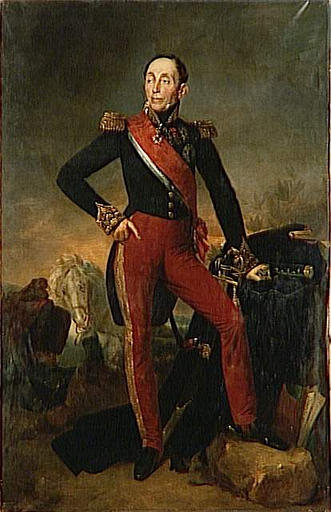<Back to Index>
- Explorer Friedrich Wilhelm Ludwig Leichhardt, 1813
- Composer Gustav Albert Lortzing, 1801
- Marshal of France Emmanuel de Grouchy, 1766
PAGE SPONSOR

Emmanuel de Grouchy, 2ème Marquis de Grouchy (October 23, 1766 – May 29, 1847) was a French general and marshal.
Grouchy was born in Paris, the son of François-Jacques de Grouchy, 1st Marquis de Grouchy (b. 1715) and intellectual wife Gilberte Fréteau de Pény (d. 1793). His sister was Sophie de Condorcet, a noted femininist. He entered the French artillery in 1779: in 1782 he was transferred to the cavalry, and subsequently, in 1786, to the Gardes du corps. In spite of his aristocratic birth and his connections with the court (as his father, having served as a page, was rumored to be the illegitimate son of king Louis XV), he was a convinced supporter of the principles of the Revolution, and had in consequence to leave the Guards. About the time of the outbreak of war in 1792 he became colonel of a cavalry regiment, and soon afterwards, as a maréchal de camp, he was sent to serve on the south eastern frontier. In 1793 he distinguished himself in La Vendée, and was promoted general of division. Grouchy was shortly afterwards deprived of his rank as being of noble birth, but in 1795 he was again placed on the active list. He served on the staff of the Army of Ireland (1796 – 1797), and took a conspicuous part in the Irish expedition. In 1798 he administered the civil and military government of Piedmont at the time of the abdication of the king of Sardinia, and in 1799 he distinguished himself greatly as a divisional commander in the campaign against the Austrians and Russians.
In covering the retreat of the French after the defeat of Novi, Grouchy received fourteen wounds and was taken prisoner. On his release he returned to France. In spite of his having protested against the coup d'état of the 18th of Brumaire he was at once re-employed by the First Consul, and distinguished himself again at Hohenlinden. It was not long before he accepted the new régime in France, and from 1801 onwards he was employed by Napoleon in military and political positions of importance. He served in Austria in 1805, in Prussia in 1806, Poland in 1807, where he distinguished himself at Eylau and Friedland, Spain in 1808, and commanded the cavalry of the Army of Italy in 1809 in the Viceroy Eugène's advance to Vienna.
In 1812 he was made commander of one of the four cavalry corps of the Grande Armée, fought at Smolensk and Borodino and during the retreat from Moscow Napoleon appointed him to command the escort squadron, which was composed entirely of picked officers. His almost continuous service with the cavalry led Napoleon to decline in 1813 to place Grouchy at the head of an army corps, and Grouchy thereupon retired to France.
In 1814, however, he hastened to take part in the defensive campaign in France, and he was severely wounded at Craonne. At the Restoration he was deprived of the post of colonel-general of chasseurs a cheval and retired. In 1815, he joined Napoleon on his return from Elba, and was made marshal and peer of France. In the campaign of Waterloo he commanded the reserve cavalry of the army, and after Ligny he was appointed to command the right wing to pursue the Prussians.
The march on Wavre, its influence on the result of the campaign, and the controversy to which Grouchy's conduct on the day of Waterloo has given rise, are dealt at length in nearly every work on the campaign of 1815. Here it is only necessary to say that on the 17th Grouchy was unable to close with the Prussians, and on the 18th, though urged to march towards the sound of the guns of Waterloo, he chose instead to follow the Prussians along the route literally specified in his orders while the Prussian and British - Dutch armies united to crush Napoleon. On the 19th Grouchy won a smart victory over the Prussians at Wavre, but it was then too late. So far as resistance was possible after the great disaster, Grouchy made it. He gathered up the wrecks of Napoleon's army and retired, swiftly and unbroken, to Paris, where, after interposing his reorganized forces between the enemy and the capital, he resigned his command into the hands of Marshal Davout.
The rest of his life was spent in defending himself. An attempt to have him condemned to death by a court-martial failed, but he was exiled and lived in America until amnestied in 1821. On his return to France he was reinstated as general, but not as marshal nor as peer of France. For many years thereafter he was equally an object of aversion to the court party, as a member of their own caste who had followed the Revolution and Napoleon, and to his comrades of the Grande Armée as the supposed betrayer of Napoleon. In 1830 Louis Philippe gave him back the marshal's baton and restored him to the Chamber of Peers. He died at Saint-Étienne on May 29, 1847.